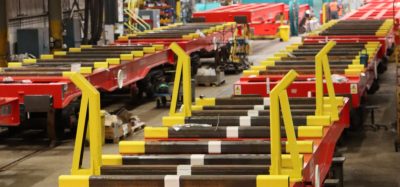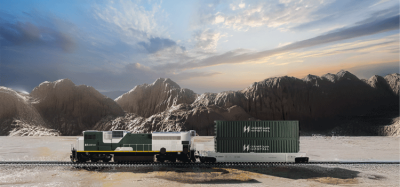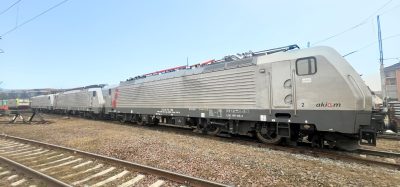Maintaining control
Posted: 12 December 2009 | | 1 comment
The decision by UK’s Freightliner Group to set up its own maintenance division has yielded transformational improvements to business performance. Maintenance of locomotives and rolling stock is a core necessity to any successful rail operator – one that is not at the forefront of attention, but when it is not done well, can significantly impact the performance that customers see and experience.
The decision by UK's Freightliner Group to set up its own maintenance division has yielded transformational improvements to business performance. Maintenance of locomotives and rolling stock is a core necessity to any successful rail operator - one that is not at the forefront of attention, but when it is not done well, can significantly impact the performance that customers see and experience.
The decision by UK’s Freightliner Group to set up its own maintenance division has yielded transformational improvements to business performance. Maintenance of locomotives and rolling stock is a core necessity to any successful rail operator – one that is not at the forefront of attention, but when it is not done well, can significantly impact the performance that customers see and experience.
In 2006, Freightliner recognised an opportunity to deviate from its core business in operating award winning trains and diversify to the maintenance of its fleet, with cost control and rolling stock performance as key success criteria.
“We believed that we could further improve reliability and reduce both downtime and costs by incorporating the maintenance function into the Freightliner business. Freightliner Heavy Haul’s business success relied on dependable maintainers trading on sound financial basis and was a key decision to ensure the security and service delivery,” explains Mr. Curtis.
And so it has proved.
Freightliner acquired a maintenance depot and took on 13 staff in Leeds from a former supplier to launch FML in 2006. At the time, only 26 of the company’s 75 Heavy Haul locos were maintained at that facility.
The FML team has examined all aspects of the maintenance programme to seek efficiencies and cut both downtime and costs. It now works with Freightliner Ltd, the intermodal division, bringing locos due for maintenance to Leeds utilising existing scheduled services.
“The first thing we did was transfer the responsibility for the remaining 49 Heavy Haul locos to Leeds as well,” says Mr. Curtis. “This resulted in greatly improved productivity. Through better planning, more flexible working hours and closer co-operation between the operators and the maintenance team, we made the process much more efficient.”
FML also invested in training and equipment to ensure that the team was able to undertake the ‘F’ (six yearly) exam for the locos. Previously, the facility was only undertaking up to the ‘D’ (annual) exams and the ‘F’ exams (six yearly) had been carried out by another maintenance contractor.
“We launched in April and by September the team had been trained in the greater scope of work and of materials sourced for the ‘F’ exam,” says Mr. Curtis. “The previous supplier had taken two weeks to undertake this level of exam work. With our better scheduling of locos coming to Leeds, planning of materials and greater efficiency, we can now do it in a week.”
By September 2009, FML had carried out ‘F’ exams on 53 locos. The reduced time needed for each exam provided Freightliner Heavy Haul an extra 265 locomotive days worth of availability.
Another task which FML has taken over from external suppliers is the wheel set change on the locos, which needs to be done every five or six years. The work had never been undertaken at the Leeds facility before.
“Again, we invested in training and equipment to ensure we could do the best possible job,” explains Mr. Curtis. “We have already reduced that time significantly from the previous two weeks and expect it to be down to four days in the near future.”
This investment includes an overhead crane which arrived in mid-2009. Mr. Curtis adds, “We used to hire a road crane when needed but having our own gives us much more flexibility. It also allows us to undertake many other repairs such as generator changes.”
As the success of the loco maintenance programme proved itself, FML made the decision to extend its scope into wagon maintenance. It took on a team of 12 people to work on the 657 coal wagons which Freightliner Heavy Haul used for various clients throughout the country.
“We are contracted to ensure 95% availability of wagons and we deliver that consistently. In fact, we are nearer 96%, and the best ever was 97%,” says Mr. Curtis. The wagons are maintained on a 6-12 month inspection rolling programme.
For both the loco and wagon maintenance programmes, the Leeds team is supplemented by field support engineers to give it national coverage and to save the time and cost of returning the rolling stock to Leeds for maintenance.
“We have engineers based at Birmingham, London, Bristol, York, Scotland and Crewe with fully mobile workshops who are able to undertake scheduled maintenance as well as handle the occasional unexpected call-out. We are an independent company within Freightliner Group and need to offer excellent service as well as competitive prices to Heavy Haul, otherwise we won’t get the business,” says Mr. Curtis.
This good working relationship was extended in 2007 when Heavy Haul decided to offer its client Lafarge Cement a one-stop-shop deal by taking over the maintenance as well as the operation of its 322 cement wagons.
Under the terms of a revised contract, FHH entered into a sale and leaseback for the sublet of the 51 tonne wagons. This was the first such deal undertaken by a haulier in the construction rail freight sector.
In comment to this, David Israel, Commercial Director, FHH said: “We are delighted to have concluded this arrangement with Lafarge Cement which demonstrates a partnership approach by both companies. With FHH undertaking the fleet management and operation, Lafarge can focus on its prime goal of cement production while we can concentrate on giving them a value-driven and efficient rail service package.”
Dave Burley, Supply & Distribution Director, Lafarge Cement added: “As the only UK manufacturer with nationwide coverage, we are committed to using rail to transport our products across the UK, as an effective and sustainable form of transport. This partnership will help our operations become more efficient and opens up new possibilities which will allow us to make further improvements in service and performance.”
The success of this arrangement encouraged FML to build up its third party work and in 2008 won a contract to maintain 48 wagons for VTG, the wagon leasing company. These 102-tonne JPA wagons were on hire to Lafarge Cement and all parties saw the logic of FML taking on the maintenance of these wagons alongside its other maintenance contract. FML utilises the maintenance facilities at Lafarge’s sites in Hope, Derbyshire and Dunbar in Scotland to undertake the maintenance.
FML has now purchased Heavy Haul’s Crewe fuel point and taken on the nine staff based there. The maintenance team has undergone training and now undertakes ‘B’ (90 day) and ‘C’ (six monthly) exams as well as the regular fuelling and servicing work they did previously.
The FML team has examined all aspects of the maintenance programme to seek efficiencies and cut both downtime and costs. It now works with Freightliner Ltd, the intermodal division, bringing locos due for maintenance to Leeds utilising existing scheduled services.
“They were under no obligation to come to us, just because we are part of the same group,” says Mr. Curtis. “But they saw the benefits of greatly reduced downtime for the rolling stock and how well it was working for Heavy Haul, so we negotiated a contract to maintain their 43 locos – a fleet which has now grown to 48.”
On commenting on changing provider, Adam Cunliffe, Managing Director for Freightliner Limited said, “The transfer of maintenance services to Freightliner Maintenance has been extremely rewarding to our business. Consistent locomotive availability maintained at an affordable rate has supported an exceptionally efficient use of locomotives throughout a very challenging economic period.”
The latest challenge for the maintenance team – and the whole of Freightliner – is the introduction of the PowerHaul locos in the fourth quarter of 2009. These locos have been produced by GE in Erie, USA in a partnership with Freightliner, and are capable of delivering increased payloads and acceleration whilst maintaining lower carbon emissions to the environment.
“We are really excited about the introduction of these new, state-of-the-art locos,” says Mr. Curtis. “Our team has been involved with the project from early on and there was a massive programme of training and investment to ensure the maintenance team was ready for the arrival of the first locos at the beginning of November.
Freightliner Maintenance, which now employs 70 people, has become a vital part of the Freightliner Group.
“The main thing is that we have provided a reliable, stable and cost-effective maintenance solution for both the Intermodal and Heavy Haul business and this has ensured that they have been able to satisfy the demands of their customers,” concludes Mr. Curtis. “We are already working for other third parties because we have demonstrated we can add real value to the customer’s operation.”
Freightliner Group’s core activity, operated through its specialist subsidiary companies, is the movement of freight by rail, ranging from the rail haulage of commodities such as aggregates and coal to the highly efficient Logico operation formed in response to demand from freight forwarders, road hauliers and manufacturers for a high quality rail-based logistics service.
Since privatisation in 1996, Freightliner Group has developed into a dynamic, profitable logistics company with a modern fleet of locomotives, rolling stock and lorries. This has enabled it to retain its market-leading share of the UK intermodal market and to develop a significant and growing share of the UK’s bulk rail freight market, in addition to commencing operations in both Europe and Australia.






